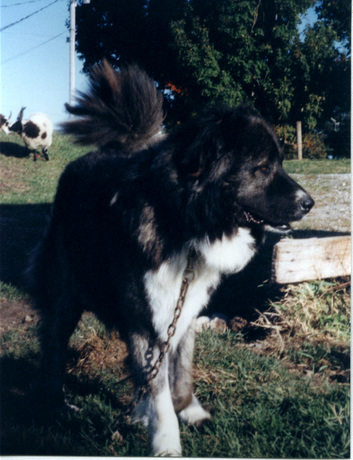ThunderHawk Caucasian Shepherd Puppies
- Home
- Introduction
- History
- Pros & Cons
- Socialization
- Appearance
- Temperament & Health
- Temperament Evaluation
- Caucasians & Kids
- Caucasians as Flockguardians
- Basic Flockguard Instinct Test (B-FIT)
- Considering a Caucasian?
- Finding the Right Puppy
- Selecting the Right Level of Protection
- Adoption
- Importing a Caucasian
- Planned Breedings
- Dams & Sires
- Caucasian Mixes
- Gallery
- Book
- Press
- NEWS!
- True Stories: CO's Protecting
- ThunderHawk Application
- Recommended Links
- Blog
- Celebrating Our Historic Dogs
Caucasians as Flock-Guardians

The Caucasian of today is no longer well-suited to the isolated life of the flockguardian -- for too many generations, this breed has been bred as a service dog to man, and the ties that bind the Caucasian to man are now much stronger than those that tie him to his flock. Our experiences with placing Caucasians on an isolated flock indicate that the Caucasian is far too "needy" to exist with only limited human interaction -- they "pine" and tend to leave their flocks to seek out human attention. If, however, the Caucasian is a family pet that also assumes flockguardian duties, they tend to do well, as long as they are of a lower ADR (Active Defense Reaction) rating. As was Ray Koppinger's (Hampshire College, Amherst, Mass., --early studies of flockguardians) experience with the higher ADR dogs left unsupervised on a flock, they are too man-aggressive, and unfortunate situations may arise from this.
Having said that, we have successfully rescued three abandoned Caucasians, (two of which were high ADR), socialized and rehabilitated them, and transitioned them to a life of sheep guardian on our farm. However, in each of these cases, the dog had not been part of a family for years and therefore, the dog was in a state of emotional starvation. This made it easier for the dog to accept the companionship of sheep in lieu of a real family. (We had tried to place the dogs, but with no success -- these unsocialized dogs were a handful, and the prospective homes were simply unprepared to deal with it.) In each of these cases, the dogs were introduced to the sheep very slowly, over a period of months of near proximity, before the dogs were ever allowed to mingle with the sheep, and then, careful supervision was implemented until the dogs could be trusted alone with the sheep. The Flockguardian Rehabilitation Procedure we designed and used on all three dogs is in our book. Click here for more information on our book.
Having said that, we have successfully rescued three abandoned Caucasians, (two of which were high ADR), socialized and rehabilitated them, and transitioned them to a life of sheep guardian on our farm. However, in each of these cases, the dog had not been part of a family for years and therefore, the dog was in a state of emotional starvation. This made it easier for the dog to accept the companionship of sheep in lieu of a real family. (We had tried to place the dogs, but with no success -- these unsocialized dogs were a handful, and the prospective homes were simply unprepared to deal with it.) In each of these cases, the dogs were introduced to the sheep very slowly, over a period of months of near proximity, before the dogs were ever allowed to mingle with the sheep, and then, careful supervision was implemented until the dogs could be trusted alone with the sheep. The Flockguardian Rehabilitation Procedure we designed and used on all three dogs is in our book. Click here for more information on our book.
Copyright 2000 - 2019, ThunderHawk Caucasians, All Rights Reserved
